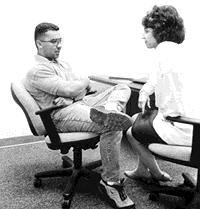| |

|
|
BULLSHIT DETECTION |
3 Pages - Page 3 |
| S.C.A.M. & Bullshit Analysis |
One former Israeli Police Lieutenant named Avinoam Sapir has developed an entire system called S.C.A.M. (Scientific Content Analysis Method) that uses something similar to Bullshit Analysis exclusively to detect lies. Bullshit Analysis works like this: it is well known that innocent people tend to answer questions differently than people who are lying. Therefore, taking heed of what a suspect says and how he says it may provide clues as to whether he is lying or not. Here are a few examples:
1. Liars usually try to minimize their actions: Instead of using words like murder, rape, or rob, the lying suspect may talk about "hurting someone," "having rough sex," or "taking something" when asked to describe what he "thinks" happened during the crime. This, in the vermin's mind, minimizes the impact of the crime.
2. Liars may try to blame the crime on the victim: When asked why a crime occurred, the liar may say things like "If she didn't dress like a whore, nothing would have happened to her."
3. Liars may blame crimes on "phantom crooks" that no one else at the scene saw. It usually goes like this: "Yeah, I know who did it. It's some dude that I know. I don't know what he looks like, though." Alternatively, the liar may say, "Naw, man - that's some other dude's dope (stolen property / murder weapon / miscellaneous) - I was just holding it for him."
4. Liars may claim unreliable memories: The liar may be able to recite the entire periodic table of elements or how many times you've arrested him, but his memory may fail him when you ask where he was when his wife was chopped into pieces or he may give several different answers to the same question over a period of time (ala O.J. Simpson).
5. Liars may not make strong, immediate denials to insinuations that there is evidence linking them to the crime: If an innocent person is told that there is evidence linking him to a crime, he will usually refute that statement immediately. Liars, however, may not do so - in fact, some liars faint, others remain perfectly silent, some weep, and others begin to make immediate confessions. Usually, if a liar does make a denial, there is a marked hesitation before the suspect does make the denial.
This is, in my opinion, because the suspect is: 1) shocked, 2) trying to think how to explain the "evidence" (real or fabricated) away, and lastly, 3) trying to figure out how he screwed up and left his fingerprints / blood / semen / hair / footprints / or anything else at the scene.
6. Liars may use "reinforcing" statements to back up their assertions of truthfulness: How many times have you heard this statement from suspects, "I swear to God, I didn't do it!"? Many times, liars use these self serving statements to strengthen their statements. Whenever you hear a suspect invoke a deity, swear upon his mother's (father's / sister's / pet dog's) grave, ask lightning to strike him dead if lying, or otherwise use some metaphor to state his innocence, beware.
7. Liars' denials to committing the crime tend to grow weaker as the interview progresses: Conversely, innocent people tend to get stronger in their denials.
8. Liars do not exhibit the normal strength of emotion that innocents do: Deceptive suspects often feign anger, sadness or other emotions such as fear, but since they are not actually feeling them, these emotional facades are hard to maintain. For example, if you are interviewing a suspect who seems to be expressing righteous anger at being accused of a crime, switch tactics momentarily and tell a joke; innocent people generally will not be able to find humor in anything you are saying, because they are still angry. The liar, however, will often "snap" out of his anger - simply because he wasn't angry to begin with. |
| End Note |
By using kinesics, neurolinguistics, and Bullshit Analysis individually you can increase your chances of detecting lies. By using all of them in concert, you can dramatically increase your chances of telling when a suspect is practicing bullshitting upon you. It takes time; it takes practice; it takes perseverance; but in the end, you will increase your ability to separate the truth from lies. It may, however, cost you a few envelopes. But that is in no comparison with knowing that justice will be done!
Right: Here you see officer Clarissa Mersey in action. She is establishing report with an alleged rapist while practising her Bullshit Detection skills. Notice the defensive kinesic behaviour of the rapist who was convicted to 25 years imprisonment after a 3 hour interrogation session. |
|
 |
|
|
|
|








|